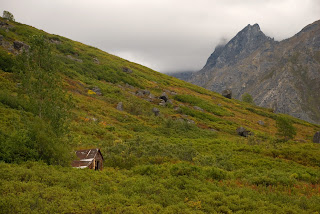Three weeks in Cordova isn't a lot of time. Not when you're remodeling a basement room into a functioning kitchen suite. But with perseverance, some help, and a whole lot of work, amazing things can happen.
We relocated temporarily back to Cordova from Anchorage while Theresa was studying for her board exam and I could do some house maintenance for a friend. This is one of those times when you feel good about being able to bless someone that has spent her whole life giving to her community; in service, support, or encouragement. But this time grace comes not from her giving, but from receiving.
Too often we have trouble with the receiving part. We can make it on our own. We don't need help. We're fine.
But the truth is in being able to live with both hands open - one to give, and one to receive. If either hand becomes clenched, then our lives become unbalanced; either from only taking what society has to offer and giving nothing back, or from giving and never being able to receive.
Both take work.
Both have their reward.
Both define community.
Friday, September 23, 2011
Saturday, September 3, 2011
Those Golden Hills
A short drive north from Anchorage puts you in the Talkeetna Mountains. These rugged, granite peaks jut viciously into the air proclaiming their dominance over the landscape, inspiring awe and reverence to anyone that ventures into their valleys. We drove up into Hatcher Pass this past week and spent a few days in the majestic beauty of this area of Alaska.
Robert Lee Hatcher staked the first gold claim in this valley in 1906, and the next thirty five years saw his claim develop into a booming mining consortium that at its peak mined 34,416 ounces of gold in one year with over two hundred men blasting away miles and miles of tunnels into the rock.
The remains of the Independence Mine is mostly in ruins, but some of the buildings have been restored as a heritage site. An interpretive trail winds through the rubble giving a brief, unique glimpse into the lives of families that lived in these hills prior to World War Two.
Children played and taught themselves to ski in the surrounding hills after a day of learning in the small schoolhouse that was incorporated into the mining camp.
The sawyers found time to make them toys in between milling timbers for cribbing in the mine shafts.
Today the hills are silent with only a placard or two adorning the rusty old equipment remaining as a witness to the vibrant, thriving community that once found its future in this valley.
As we drive away, the image of an Atlas Imperial inline 8 cylinder diesel generator, producing 275 hp at 514 rpm tugs at my mind.
I would like to have heard it run.
Robert Lee Hatcher staked the first gold claim in this valley in 1906, and the next thirty five years saw his claim develop into a booming mining consortium that at its peak mined 34,416 ounces of gold in one year with over two hundred men blasting away miles and miles of tunnels into the rock.
The remains of the Independence Mine is mostly in ruins, but some of the buildings have been restored as a heritage site. An interpretive trail winds through the rubble giving a brief, unique glimpse into the lives of families that lived in these hills prior to World War Two.
Children played and taught themselves to ski in the surrounding hills after a day of learning in the small schoolhouse that was incorporated into the mining camp.
The sawyers found time to make them toys in between milling timbers for cribbing in the mine shafts.
And the men cycled routinely through the underground, blasting, pounding, and loading their ore into buckets and hoppers in search of the flakes of gold that swept them all into this forlorn, isolated valley in the far north.
As we drive away, the image of an Atlas Imperial inline 8 cylinder diesel generator, producing 275 hp at 514 rpm tugs at my mind.
I would like to have heard it run.
Subscribe to:
Posts (Atom)











